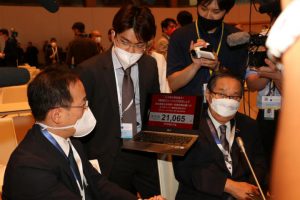First Meeting of States Parties to TPNW: Hiroshima’s A-bomb survivors and youth group express anger and disappointment over Japan’s absence
Jun. 22, 2022
Despite direct plea to foreign ministry official
by Junji Akechi and Kana Kobayashi, Staff Writers
On June 21, the First Meeting of States Parties to the Treaty on the Prohibition of Nuclear Weapons (TPNW) kicked off in Vienna, Austria. While representatives from ratifying countries and observer nations are in attendance, government representatives from the A-bombed nation of Japan decided not to participate in the meeting, even as an observer nation. Japan’s absence generated anger and disappointment, especially among A-bomb survivors monitoring the progress of the meeting from Hiroshima. At the meeting venue, a young Japanese person engaged in activities aiming at the abolition of nuclear weapons pressed an official from Japan’s Ministry of Foreign Affairs for Japan’s attendance at the TPNW meeting.
Toshiyuki Mimaki, 80, chair of the Hiroshima Prefectural Confederation of A-bomb Sufferers Organizations (Hiroshima Hidankyo), was deeply disappointed because he had pinned his hopes on Prime Minister Fumio Kishida (representing Hiroshima Prefecture’s District No. 1), who has said that a world without nuclear weapons is his life’s work. Mr. Mimaki was emphatic when he said, “I thought it was good timing for us to have the new prime minister from Hiroshima in attendance. Given how many people died in the atomic bombing of Hiroshima, one wonders why he wasn’t able to make the decision to have Japan attend the meeting as an observer.”
Germany and the Netherlands, members of the North Atlantic Treaty Organization (NATO) that are reliant, as Japan is, on U.S. nuclear forces, announced their decision to participate in the meeting as observer nations. Australia, a member nation of the Quadrilateral Security Dialogue (QUAD) — which is a security alliance wary of China that includes Australia, Japan, the United States, and India — also participated in the meeting as an observer nation.
Kunihiko Sakuma, 77, chair of the other Hiroshima Hidankyo, cast doubt on Japan’s national government position. “I can’t understand why Japan is so inflexible about attending the meeting. Observing trends in other nations, my guess is it would be possible for Japan to attend the meeting without destroying its alliance with the United States.”
On June 20 in Vienna, a day before the TPNW meeting got its start, the Conference on the Humanitarian Impact of Nuclear Weapons was held, with a Japan government delegation in attendance. Soon after that conference concluded, Yuta Takahashi, 21, who holds the position of Youth Communicator for a World without Nuclear Weapons at the Ministry of Foreign Affairs, rushed over to Yoshizane Ishi, director of the Arms Control and Disarmament Division at the ministry, and once again demanded Japan’s attendance at the TPNW states parties meeting as an observer. Mr. Takahashi serves as joint representative of Kakuwaka Hiroshima, a civic group mainly composed of young voters in Hiroshima who are actively learning about nuclear policies.
Mr. Takahashi also showed Mr. Ishi a screen on his computer indicating the roughly 21,000 signatures that Kakuwaka Hiroshima had collected at the last minute online to call for Japan’s attendance. In response, Mr. Ishi simply reiterated the government’s conventional stance. “The TPNW is important, but nuclear weapons states are yet to join the treaty.” Mr. Takahashi said, “I feel disappointed because just today we held debates on the humanitarian impact of nuclear weapons.”
(Originally published on June 22, 2022)








